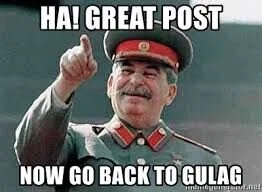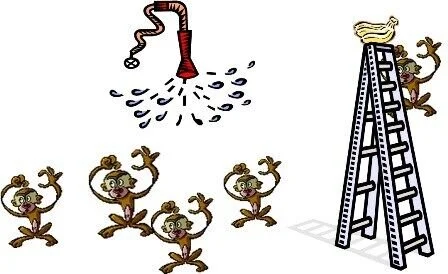Why We Should Try To Tolerate Even The Worst Speech In Our Social Circles
Note: This is my best crack at Steelmanning Free Speech as a broad concept — somewhat of a response piece to my earlier essay: Steelmanning Censorship: An Argument for the Removal of Content, but not actually challenging any of that argument. My hope is just to present a positive initial framework in support of “Free Speech” and not a negative reactionary argument attacking Censorship. I welcome disagreements and challenges to the content, as well as points in favor and refinements of the argument.[0]
The outline of my Argument is simple: broad social acceptance of Free Speech norms i) helps us make better choices ii) maximizes the value of individual identity, and iii) actually improves social cohesion & strengthens our shared Institutions over the long-run.
Picturing the Free Speech Debate: Blue and Red sections here have the exact same average value. By analogy, Blue represents internal Thought and Red represents socially-accepted Speech. The scale & respective Standard Deviations are defined by (y)our Culture.
i) Individual Authenticity Leads to Better Choices
A million years of evolution ensures that the average human is acutely aware of how social expressions are received by those around them. Failure to notice signals of disapproval has potentially-dire consequences in any social system (and the Panopticon Prism of social media now brings the entire human population “around” each of us, 24 hours a day, 365 days a year).
The more advanced portions of our brain also allow us to learn from the failures of others: we can do complex IF [X] THEN [Y] predictions without actually needing to do [X] ourselves.
Combine these two observations and it’s apparent that the average person modulates their outwardly-expressed thoughts to reflect the range of socially acceptable expressions, without actually needing to risk being sanctioned themselves. This is ultimately a good thing, as it provides a nice “check” on certain expressions — particularly ones that escalate social tensions (e.g. the number of times people think “I want to kill that person!” or “I want to sleep with that person!” is much greater than the number of times they express that thought).[1]
To state the obvious: when people falsify their Preferences in order to reduce social friction, what they Say is different from what they Think. The map is not the territory, and if you make it to college without internalizing a large set of rules governing What You Can’t Say then you missed a critical part of developmental socialization.
But from a purely self-interested perspective, I want to know their thoughts. If there’s value there, I’d like to mine it. If there’s danger there, I’d like to prepare for it. If there’re inaccuracies, I’d like to correct them (via 10k word essays, hi). If there’s a real person in there, I’d like to know them instead of the mask they wear for polite company.
In each case, my own ability to model reality (map) is improved by having a more accurate approximation of someone’s true internal thoughts (territory). This extends outwards somewhat — everyone else also gets to build better social models and make more accurate predictions if they have a clearer understanding of other people’s true thoughts.
Much of the Pro-Censorship case I made was expressly made “for the benefit of others” — in recognition of the fact that the far ends of the bell curve do not have the mental fortitude to encounter a radical idea without being converted (note the passive voice). I’m not interested in rebutting that argument here, but it’s important to note that the starting point for my Pro-Free Speech case is, at least when it comes to the immediate first-order consequences, “for my own benefit”.
So I get to make better choices, others like me in society get to make better choices, but what about the individual falsifying/modulating their own expressions? Net-net, it’s still bad for them to express those thoughts, right?
Right. So long as there are negative consequences for the expression of certain thoughts, those thoughts will be repressed — with the necessary consequence that the rest of us end up clueless/impoverished/endangered/unconnected depending on the nature of the hidden thoughts. And the individual in question ends up feeling like:
A phrase that captures the meaning of preference falsification exactly is “living a lie.” It was developed by East European dissidents during their long winter of communist dictatorship…to live a lie is to be burdened by one’s lie…[to feel] guilt for avoiding social responsibility…anger for having failed to live up to one’s personal standards…resentment for having been induced to suppress one’s individuality.
Stalin’s Free Speech position is hard to defend…
There’s a thin grey line here. Stalin is a Weak Man of the opposite side here, and it doesn’t take a genius to imagine thoughts that we’d all prefer not to hear. The debate lies in where we draw that line (and who gets to draw it). But this section is not about drawing lines of acceptability. I’m just trying to make the point here that Free Speech norms help me make better choices about my own finances, safety, knowledge-base, and friendships — and that Censorship creates an emotional and psychological burden I have no interest in experiencing.
ii) Individual Identity: You Are Defined By What You Choose To Do
A society that forces everyone to be inauthentically Good removes meaning from “Good”. The outcome might be Good, but there’s no virtue in it. Without choice the individual is irrelevant and sacrifices their personal identity in favor of the group’s. “Good” people become indistinguishable from “Bad” people when everyone is sufficiently constrained — and the primary marker of a “Bad” person becomes social-nonconformity instead of the relative “Badness” of their choices.[2]
Today’s social restrictions on heterodox speech might be a long, long way from Stalin’s, but the principle remains the same: you devalue your own expressions in lockstep with the degree to you which restrict the choice of expression.
Put another way:
You are defined by your choices and if you didn't have the freedom to do the opposite, you didn't choose anything and aren't defined at all.
Put a third way:
The essential aims of life are present naturally in every person. In everyone there is some longing for humanity's rightful dignity, for moral integrity, for free expression of being and a sense of transcendence over the world of existence. Yet, at the same time, each person is capable, to a greater or lesser degree, of coming to terms with living within the lie. Each person somehow succumbs to a profane trivialization of his inherent humanity, and to utilitarianism. In everyone there is some willingness to merge with the anonymous crowd and to flow comfortably along with it down the river of pseudolife. This is much more than a simple conflict between two identities. It is something far worse: it is a challenge to the very notion of identity itself.
iii) Stronger Institutions: Free Speech Norms Remove Intellectual Rot in Our Shared Mental Models
The consequences of this society-wide modulation of internal-thought extend to the integrity of our institutions. There are mere questions that are not appropriate to ask — in good faith — in each and every society, because the questioning itself suggests the asker has not 100% internalized their society’s most sacred values (& taboos).
In some places those questions revolve around the existence and limitations of God. In some places they involve questions of political autonomy & equality. Often they involve the local sports team.
Any mildly competent institution will tend to favor socially restricting certain Questions. Even when the asker themselves clearly does not intend to challenge authority, an institution must guard against less-committed onlookers being swayed from the fold by an inadequately answered Question.
Church-goers will eagerly engage with, “How should I live my life in order to please the Lord?”, but instinctively reach for social sanctions when confronted with Epicurus’ Trilemma. Not because there are no good religious arguments against the Trilemma. Precisely the opposite! There are some great arguments against it — but they involve a long, detailed discussion on the nature of “Good” and on the importance of Individual Meaning and Choice (refer to prior section of this essay).
I don’t mean to be rude when I say that a proper nuanced discussion of Epicurus’ Trilemma is beyond the abilities of many church-goers. It is beyond the ability of most people. Worse, the final conclusion is likely to be more troubling than comforting, to spawn more uncertainty than faith.
If you believe in your own institution, if you think your institution works towards a worthy purpose, it’s in your own best interest to inculcate a habit of socially-sanctioning those who ask Questions that have deeply complex answers and whose discussion tends towards unsatisfying resolutions.
Informal surveys suggest most of my readers are not regular church-goers, which is why I picked the example above. It’s easy to see why and how institutional habits develop when you yourself are not a part of that institution.
But you’ll find the habits of institutional aversion to “tricky” Questions extend everywhere there’s a modicum of social cohesion.[3] If you can’t think of genuine non-trolling questions which will nonetheless trigger social sanctions instead of engagement from well-meaning members of a given institution, you probably don’t understand that institution’s goals & worldview well enough.
So that’s why our institutions turn to ostracism and penalism so readily. But, like everything, this policy has a cost. There’s no free lunch for institutions.
First, they stunt their own intellectual growth. When challenges to Orthodoxy are prohibited, the Church atrophies. When challenges are weathered and overcome, the Organization grows stronger.
And ironically, the more you hate them, the more you’re helping the myth of the Patriots remain strong.
This is true even of bad, obviously-wrong, borderline-trolling-level challenges because people forget, or perhaps never learn to begin with, the intellectual reason why those Questions are so obviously bad/wrong/trolling. We take our cues from our superiors in any organization. If we never learnt the rational foundation to dismantle “tricky/trolling” questions, all we have to defend our team is social shaming and emotional appeals.
If you haven’t had the unpleasant experience of a public talking head taking your side on an ideological issue but then supporting it with vapid reasoning and middle-school-level argumentation, then you might have missed the last 3 decades of U.S. politics. It should have occurred to you a long time ago that most of the people on your side couldn’t rationally justify their position.
Much has been made of the ever-heightening emotional tension (“Polarization”) in our public discourse, which is clearly true and worrying, but I fear cause and effect are sometimes confused.
I’m sure things have come together since 2014 though
Many parents have experience arguing with a young child:
Child: I want that
Parent: You can’t have it right now
Child: But I want it
Parent: Well you can’t have it
Child: But I should have it
Parent: No you most certainly should not
Child: I hate you!
[Note the implied value systems difference between each “should” and how that leads inexorably to the next statement…]
If you’re a good parent you recognize that “I hate you!” is a meaningless statement, the product of a still-developing mind trying to assert its will on the world and dealing with the limitations of long-term consequences, scarce resources, and other free-willed human beings. The “hate” is the last step, not the first. The intense emotional response an ego-protective shield for the underdeveloped intellectual response.
I’m suggesting that for many, the Polarized hatred they feel is a result of not fully understanding the intellectual arguments — not for their opponents beliefs, but for their own. When engagement is impossible, conflict is inevitable.
What happens when you bring together a group of young children with opposing desires and the inability to calmly & confidently articulate a persuasive justification for those desires?
Picture unrelated. Follow me on Twitter btw.
A second-order consequence of socially restricting certain Questions from being asked is that only the most socially-inept or sociopathic individuals challenge institutional Orthodoxy. The rest of us easily perceive the social difficulties or uncaring assholery that accompanies these Questions and form an unflattering heuristic model (“stereotype”) of what it means merely to Question.
It is not a heuristic model we wish to be associated with.
This poisons the well of institution-critique with a brutal negative feedback loop, one end result of which is a public sphere full of intellectually stunted “dialogue” between respected members of the clergy and people who have no social capital left to lose — if they ever had any in the first place.
Beta readers told me they couldn’t recognize a young Alex Jones in this gif
Maybe you do think things are currently at a Global Optimum across all institutions, in which case socially restricting certain discussions might actually be a valid Zero-Sum tactic to ensure continued victory (hip-hip-hooray for the status quo!).
On the one hand, that seems rather sad and defeatist, to think this is as good as it gets. On the other hand, perhaps it’s not a terrible low-resolution view of major Western institutions post-Berlin Wall. The End of History was published in 1992, and while History has in fact not ended (I will gladly argue the content of this book with anyone), perhaps its study and understanding among America’s elite college graduates has. Shockingly few millenials have any idea when and why the Berlin Wall came down.
“We won the Cold War because we’re the good guys, duh” is the short version, updated for the modern era with references to God removed. “Capitalism and liberal democracy and enormous Federal deficits and a free press.” is the long version, but it doesn’t mean much more than the short version.
We don’t know. We never dared ask the questions, and when we did, our teachers never had easy answers. We never learned to defend — to justify — our apparent victory. The results:
i) We told ourselves: “China will inevitably liberalize because free markets are good and their autocracy makes them the bad guys!”
And ii)
Most of our enemies share a common social philosophy that, at its core, is psychic: don't trust any country where women are regularly more powerful than men; where individuals are more important than a collective; and where personal beliefs and freedoms trump historical identity. Because that means that its men are weak, its individuals are selfish, and they cannot be trusted to act in the long term interests of their own people. Rather than responding seriously to this insane worldview, with equal fervor-- and it's so easy to do it-- the country has instead chosen to release this press statement: "
BushObamaTrump lied."
Apologies to TLP for the very-minor-edit of his quote above, but I posit that, for many, it’s not so easy to “respond to this insane worldview”. Oh, we’ve got the fervor part down alright, but fervor alone doesn’t change minds, it only stills tongues and raises fists. “I hate you!” is all we’ve got left.
What does any of this have to do with Free Speech?
When we willingly entertain even the thorniest Questions about our institutions we push those institutions to progress, we strengthen public confidence in them, we co-opt Narratives that would otherwise push certain individuals to fringe/extremist Orthodoxies, and we help to remove the intellectual rot that inevitably sets in when an institution becomes successful enough that membership becomes a “default” option.
Pictured: us
If we can’t handle the insane questions with confident grace, we never teach the next generation why things are the way they are, why Good is good, why our institutional goals are what they are, and where we are failing such that our opponents have reasonable ground to critique us. Sooner or later our intellectual tradition is forgotten, and though we may, in the end, “do the right thing”, we’re no better than the apocryphal room full of monkeys who only shy away from the ladder out of social fear. We do not understand.
We cannot grow.
Notes
[0] It’s interesting to note many of the “Arguments For” Free Speech actually take the form: “Defences Of” Free Speech.
The Power to Speak as you please, intelligibly or not, is a base state of nature. You have it by default, from birth, along with all the other animals. The Freedom to exercise that Power is then socially constrained down from “hysterical tantrums” to “enlightened thought.” Sadly this socialization process does not work for everyone (visit /r/publicfreakout for endless examples). But although adults throwing tantrums might be unpleasant, they don’t inspire Free Speech debates…
An Argument For Free Speech is therefore a petition for inaction.
Not an easy task! Such petitions have historically failed miserably in any remotely democratic institution. “We the people” tend to prefer action to inaction, much to the displeasure of Libertarian and Anarchist political parties around the world. (Entirely undemocratic institutions are not a counter-point here, they’re just immune to petitions)
I try here to present an Argument For Free Speech without adopting a defensive frame, to show that Free Speech is good instead of that restricting speech is bad. If you take the position, as I do, that our Laws are far downstream of our (Social) Culture, convincing people to tolerate Speech outside their comfort-zone in their day-to-day lives is always more important than quibbling over Legal frameworks.
[1] Eric Weinstein discussed this “Preference Falsification” with Professor Timur Kuran on a recent episode of his podcast here: https://www.youtube.com/watch?v=xzjqjU2FOwA
The Consequentialist arguments presented in my Steelman of Censorship essay are compelling, but compressing all possible Speech down to a narrow band of “harmlessness” is not the same as compressing all opinions, all Thought, down to that same band. This is perhaps the primary self-deception necessary to restrict speech.
Someone doesn’t write What You Can’t Say without first having a Thought that cannot be said, and then recognizing and conforming with the socialization / Censorship process. They still had the thought. The only difference is that now none of us know what it was. We still don’t.
[2]A first-order Consequentialist has no problems with this. If everyone acts Good, then that’s a Net Good outcome!! Besides, if the end goal is everyone acting “Good”, social pressure leading to self-imposed constraint is surely preferable to violent coercion. It’s not immediately clear what the 2nd and 3rd-order consequences are of tightening the range of socially acceptable ideas, but then failure to anticipate and account for higher-order consequences has always been a problem for Consequentialism.
[3] I don’t mean to over-reference Eric Weinstein, but I find his 2017 tweetstorm on “Trade Lies” (I prefer “orthodoxy” to lies, for all the obvious parallels) a great example of this institutional Question-aversion in the highly educated political-economic circles.









